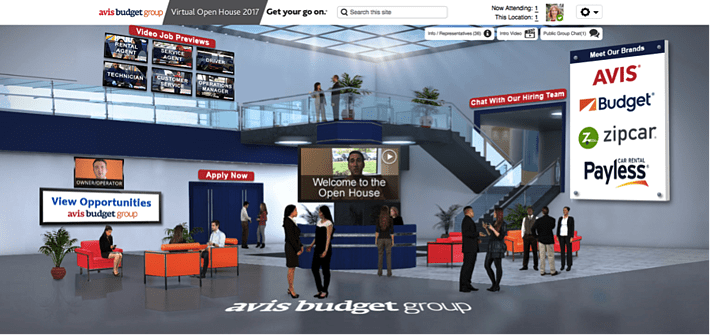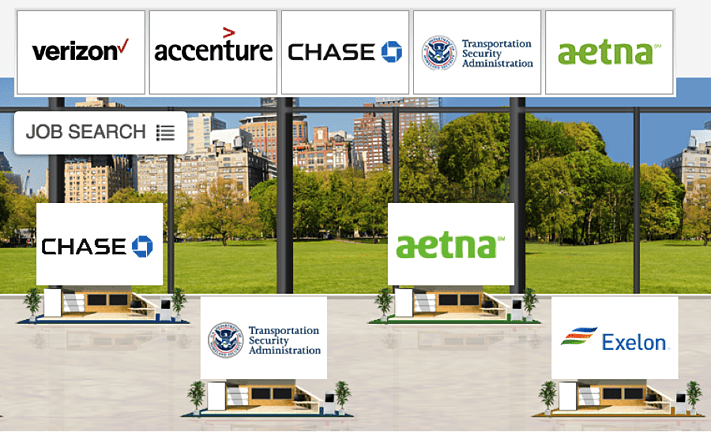We can all agree that hosting and preparing a virtual career fair takes a lot of hard work. Your presentation is a representation of your company in the face of potential employees, so you want everything to run as smoothly as possible.
Luckily, we’ve created the ultimate guide to hosting an online career fair, complete with a useful infographic below. Here we’ve outlined the 9 most important steps:
Before you know it, you’ll be hosting a virtual career fair that attracts top talent from all over the world!
But first, if you’re still wondering “what is a virtual job fair, exactly?”, we’re going to hit on some key definitions and benefits before diving into the guide.

Online job fairs allow organizations to run elaborate or simple recruiting events with the help of virtual career fair software.
The perks? Branded e-environments with lobbies or welcome areas, video greetings from company executives, exhibit halls with booths, rooms where candidates can chat with recruiters to learn more about an organization in real-time, and the list goes on.
Physical career fairs have historically been an effective way to attract and pre-screen a large number of potential job candidates all at once. Today, however, two major factors have lessened their efficiency:
But wait, there’s more…
One of the lesser-known benefits of hosting a virtual career fair is the ability to attract hard-to-find “passive” candidates.
Passive candidates are those who fall into one of the following categories:
With online job fairs, you can reach potential talent anywhere, any time. So let’s teach you how to run one.
Here is your official virtual career fair checklist. From planning to follow-up, here are the best practices in the industry.
There are two general types of virtual career fair software on the market:
Budget-conscious organizations that want the basics can go with a chat-only solution.
Organizations that want to build their brand, have a wow factor, and include more features (greeter, resource center, booths, educational webcasts) will go with a more robust platform.
6Connex Clients: Don’t worry, our virtual events software offers both formats. For curious readers, check out our features by requesting a demo today.
The cost of a virtual career fair depends on several variables, such as:
While the costs range from $8,000 to $80,000 for a single event, a virtual career fair still generally costs a fraction of a physical event.
Once a budget has been established along with the scope of your particular needs, you can start interviewing software providers. Read more about guidelines on how to evaluate and choose a virtual conference provider.
Developing an effective strategy that covers the basics and sets goals for your event is crucial to succeeding as a host. Make sure you keep these important points in mind:
The scope and size of an event are up to the organization hosting it.
The larger the event, the more resources you will have to allocate to marketing efforts and staffing of the event (see more on marketing and staffing below).
Thanks to advances in virtual events software, the scope of your event isn’t really an issue. It has never been easier to create an online career fair. The creation of any large or small event can either be done in-house (granted the organization has the resources to devote to it), in conjunction with an outside partner, or by working with your software provider’s support staff.
What if attendance exceeds your expectations during planning? No worries.
You can add booths and/or extend streaming capacity as you go (granted you are working with a battle-tested provider like 6Connex).
The nice thing about the virtual booth is that it allows you to get creative with the kind of information you want to present to potential employees as well as the format you want to display it in.
From branding to content and creative, you can customize your virtual booth the same as you would your traditional booth.
No design experience? No problem.
Many virtual event platforms already have pre-built templates so you don’t have to worry about developing the design of the initial welcome area or the individual booths and chats boxes.
Not sure what to stock in your virtual career booth? Here is a brief list of must-haves:

Don’t forget to staff your booth for all of the days that the event is live!
Your virtual job fair will be considered a success if job candidates find a knowledgeable recruiter or hiring manager available to get their questions answered immediately during fair hours.
Recruiters receiving too many repetitive questions? Here’s the solution.
Consider compiling a messaging sheet of standard responses for recruiters to pull from, to ensure similar responses and time efficiency.
Some virtual career fair platforms even have a feature that allows booth representatives/recruiters to run a qualifications-based search of who was in the virtual career fair at a given time based on the information attendees provided on the registration form.
The best part? Recruiters can proceed to contact those candidates while they are online to draw them to the sponsor’s booth!
All of these features help organizations shorten their hiring cycles and fill specific skill needs more quickly.
By using a virtual event platform like 6Connex to host your career fair, you can easily use pre-built templates to walk users through the virtual recruiting process step-by-step.
As the career fair gets closer, take time to reach out to event partners, sponsors and/or speakers to educate them on the expectations and requirements for the event.
Make sure you’re all on the same page before the fair begins. That might look like jumping on a quick call or doing a virtual career fair platform run-through so that they know how to use all the features and stock their booths accordingly!
More than anything, you want your career fair attendees to be able to find knowledgeable recruiters or hiring managers who can help answer their questions at all times during the fair hours.
Make sure you have the right amount of staff ready to help your job candidates, whether that be freelancers, interns, or employees within your own company.
As with any career fair, the challenge is getting candidates to attend. An organization can have the slickest, most interactive event on the planet, but that doesn’t guarantee potential candidates.
How do you do it? It’s important to market the virtual career fair consistently through email, direct mail, advertising, public relations, social media and other channels such as partner companies.
Integrated marketing campaigns work best for career fair promotion. The more diverse the selection of marketing vehicles used, the better the chances of reaching more potential attendees.
A full-time marketing person is not required for these efforts. However, it is best if someone involved with marketing takes charge.
Once potential candidates have registered, organizations need to set up a regular email drip, social media, and other communications schedule to keep attendees informed, with a final reminder going out the day before.
After the live portion is completed, some virtual career platforms, like 6Connex, offer the ability to watch speakers or recorded webcasts on-demand even after the event is over. These organizations should send out regular reminder emails that the virtual event is still open.
The reminders should include information about useful materials such as:
Now that you’ve done so much hard work, you can officially launch your career fair!
If your platform gives access to a resource center, make sure it is loaded up with downloadable content from the career fair. This is one way that companies use virtual events for lead generation.
Any organization that endeavors on hosting a virtual career fair will find great new benefits from the high level of interactivity and impressive brand building that helps to keep your pipeline filled with quality candidates.
Congrats! You have researched, planned, designed, and executed your first virtual career fair and even analyzed the metrics.
Now what?
Don’t forget to follow up with the candidates that your recruiters interacted with.
Use any contact information the recruiters received to reach out to the potential candidates that haven’t applied yet or may have more questions. You can even track candidates who moved to the next step in the hiring process to track the overall success of the event.
While face-to-face meetings are still important, now they can often be pushed back further in the hiring process when interest levels on both sides are high.
Until that time, virtual career fairs provide a high level of interactivity and impressive brand building that helps to keep an organization’s pipeline filled with quality candidates.
Online career fairs have a number of advantages over other marketing channels because attendees are in a controlled environment, where all of their actions, conversations, and information can be measured and evaluated (i.e. views, click-through rates, etc).
These metrics and reports provided by your hosting platform’s technology are key to improving future events. Analyze your virtual event reports them to identify features that were popular or not so popular to the candidates and adjust for future events.
For more information on the 6Connex Virtual Career platform, go to www.6Connex.com.